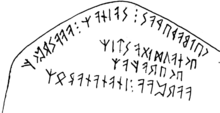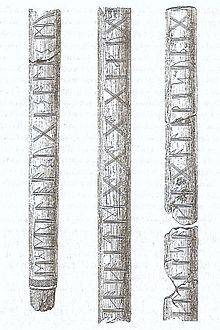User:-sche/ek
Appearance
Icelandic
[edit]





Alternative forms
[edit]Pronoun
[edit]ég
- I (first-person singular pronoun)
- 150–350, inscription on the Lindholm amulet:
- ᛖᚳᛖᚱᛁᛚᚨᛉᛋᚨᚹᛁᛚᚨᚷᚨᛉᚺᚨᛏᛖᚳᚨ
- ek erilaz sa[w]ilagaz hateka
- I [am an] earl, Sawilagaz hight I
- ek erilaz sa[w]ilagaz hateka
- ᛖᚳᛖᚱᛁᛚᚨᛉᛋᚨᚹᛁᛚᚨᚷᚨᛉᚺᚨᛏᛖᚳᚨ
- 250–450, inscription on the Tune runestone:
- ᛖᚲᚹᛁᚹᚨᛉᚨᚠᛏᛖᚱᚹᛟᛞᚢᚱᛁ / ...
- ek wiwaz after woduri / […]
- I, Wiwaz, after Woduri / […]
- ek wiwaz after woduri / […]
- ᛖᚲᚹᛁᚹᚨᛉᚨᚠᛏᛖᚱᚹᛟᛞᚢᚱᛁ / ...
- circa 425, inscription on the w:Golden Horns of Gallehus:
- ᛖᚲᚺᛚᛖᚹᚨᚷᚨᛊᛏᛁᛉ᛬ᚺᛟᛚᛏᛁᛃᚨᛉ᛬ᚺᛟᚱᚾᚨ᛬ᛏᚨᚹᛁᛞᛟ᛬
- ek hlewagastiz: holtijaz: horna: tawido:
- I, Hlewagastiz Holtijaz, made the horn
- ek hlewagastiz: holtijaz: horna: tawido:
- ᛖᚲᚺᛚᛖᚹᚨᚷᚨᛊᛏᛁᛉ᛬ᚺᛟᛚᛏᛁᛃᚨᛉ᛬ᚺᛟᚱᚾᚨ᛬ᛏᚨᚹᛁᛞᛟ᛬
- 250–450, inscription on the Hogganvik runestone:
- ᛖᚲᚾᚨᚢᛞᛁᚷᚨᛋᛏᛁᛉ / ...
- ek naudigastiz / […]
- I, Naudigastiz, / […] [1]
- ek naudigastiz / […]
- ᛖᚲᚾᚨᚢᛞᛁᚷᚨᛋᛏᛁᛉ / ...
- 200–475, inscription on the Kragehul I spear-shaft:
- ᛖᚳᛖ⁀ᚱᛁᛚᚨ⁀ᛉ...
- ek e⁀rila⁀z asugisalas m⁀uh⁀a h⁀aite […]
- I, earl of Asugisalaz, hight Muha, […]
- ek e⁀rila⁀z asugisalas m⁀uh⁀a h⁀aite […]
- ᛖᚳᛖ⁀ᚱᛁᛚᚨ⁀ᛉ...
- circa 1000, Vǫluspá, verse 1, line 1:
- Hliods bið ec allar... (Codex Regius, circa 1270)
- Hlioðs bið ek allar... (Hauksbók, circa 1306)
- Hljóðs bið ek allar... (normalised orthography)
- For silence I ask all...
- 1220-1240, Egils saga, chapter 3, line 16:
- "Þótt þetta vandræði hafi nú borit oss at hendi, þá mun eigi langt til, at sama vandræði mun til yðvar koma, því at Haraldr, ætla ek, at skjótt mun hér koma, þá er hann hefir alla menn þrælkat ok áþját, sem hann vill, á Norðmæri ok í Raumsdal." (Norse)
- translation by William Charles Green:
- Though this danger now touches us, before long the same will come to you; for Harold, as I ween, will hasten hither when he has enthralled and oppressed after his will all in North Mæra and Raumsdale.
- translation by Hallvard Lie:
- Though this trouble have now lighted on our hand, 'twill not be long ere the same trouble shall come upon you; for Harald, I ween, will shortly hither come, soon as he hath all men thralled and enslaved, according to this will, in Northmere and Raumsdale.
- translation by William Charles Green:
- "Þótt þetta vandræði hafi nú borit oss at hendi, þá mun eigi langt til, at sama vandræði mun til yðvar koma, því at Haraldr, ætla ek, at skjótt mun hér koma, þá er hann hefir alla menn þrælkat ok áþját, sem hann vill, á Norðmæri ok í Raumsdal." (Norse)
- 1584, Guðbrandsbiblía, Genesis 1.29 (orthography as in the 1899 printing and the 1908 printing):
- Og Guð sagði: sjá, eg gef ykkur alls konar sáðberandi jurtir […]
- Then God said, “I give you every seed-bearing plant […] ” (NIV)
- Og Guð sagði: sjá, eg gef ykkur alls konar sáðberandi jurtir […]
- 1656-59, Passíusálmar (Passion Hymns), hymn 1, verse 1 (orthography as in the 1887 printing):
- Upp, upp, mín sál og allt mitt geð,
- upp mitt hjarta og rómur með,
- hugur og tunga hjálpi til.
- herrans pínu ég minnast vil.
- translation by William Charles Green:
- Up, up, my soul and all my mind,
- Up, O my heart and voice combined;
- Help, thought and tongue; for I would fain
- Wake memory of our Lord's dear pain.
- translation published in Parergon, issues 1–13 (1971), page 31:
- Up, up my soul and all my mind,
- up my heart and voice as well.
- Thought and tongue help out.
- I intend to remember the Lord's suffering.
- translation by William Charles Green:
- 1800-1840, Bjarni Thorarensen, Solatium:
- Kvíði ég ei dauða,
- konulaus maður,
- 2000, Arnaldur Indriðason, Mýrin, page 59:
- — Þekki ég þig? sagði hann. Um hvað ertu að tala? Hver ertu?
- — Ég heiti Erlendur. Ég er að rannsaka morð á manni að nafni Holberg í Reykjavík.
- Jar City: A Reykjavík Thriller, translation by Bernard Scudder:
- "Do I know you?" he said. "What are you talking about? Who are you?"
- "My name’s [=I’m] Erlendur. I’m investigating the murder of a man from Reykjavik by the name of Holberg."
- Jar City: A Reykjavík Thriller, translation by Bernard Scudder:
- 150–350, inscription on the Lindholm amulet:
References
[edit]- ^ James E. Knirk, Runic inscription from Hogganvik, Mandal, Vest-Agder (2009) (preliminary report), 27 October 2009
